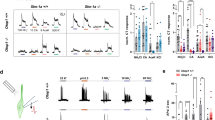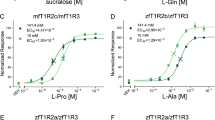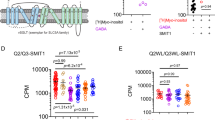Abstract
In taste chemoreception, cyclic adenosine monophosphate (cAMP) appears to be one of the intracellular messengers coupling reception of stimulus to the generation of the response. The recent finding that sweet agents cause a GTP-dependent generation of cAMP1 poses the question of how this cytosolic messenger acts at the membrane of taste receptor cells. We have shown that cAMP causes a substantial depolarization in these cells2. Here we show with whole-cell recordings and inside-out membrane patches that the depolarization caused by cAMP is accounted for by the action of cAMP-dependent protein kinase, which inactivates potassium channels predominantly of 44 pS conductance. Thus, intracellular signalling of the gustatory cells differs from that of olfactory3 and photoreceptor cells4,5, where cyclic nucleotides control unspecific channels by binding to them rather than by inducing their phosphorylation.
This is a preview of subscription content, access via your institution
Access options
Subscribe to this journal
Receive 51 print issues and online access
$199.00 per year
only $3.90 per issue
Buy this article
- Purchase on Springer Link
- Instant access to full article PDF
Prices may be subject to local taxes which are calculated during checkout
Similar content being viewed by others
References
Striem, B. J., Pace, U., Zehavi, U., Naim, M. & Lancet, D. Chem. Senses 11, 669 (1986).
Avenet, P. & Lindemann, B. J. Membrane Biol. 97, 223–239 (1987).
Nakamura, T. & Gold, G. H. Nature 325, 442–444 (1987).
Fesenko, E. E., Kolesnikov, S. S. & Lyubarsky, A. L. Nature 313, 310–313 (1985).
Haynes, L. W. & Yau, K.-W. Nature 317, 61–64 (1985).
Hamill, O. P., Marty, A., Neher, E., Sakmann, B. & Sigworth, F. Pflügers Arch. ges. Physiol. 391, 85–100 (1981).
Kinnamon, S. C. & Roper, S. D. J. Physiol. 383, 601–614 (1986).
Avenet, P. & Lindemann, B. J. Membrane Biol. 95, 265–269 (1987).
Ashby, C. D. & Walsh, D. A. J. biol. Chem. 247, 6637–6641 (1972).
Whitehouse, S. & Walsh, D. A. Meth. Enzym. 99, 80–93 (1983).
Hofmann, F. J. biol. Chem. 25, 1559–1564 (1980).
Ingebritsen, T. S. & Cohen, P. Science 221, 331–337 (1983).
Heck, G. L., Mierson, S. & DeSimone, J. A. Science 223, 403–405 (1984).
Author information
Authors and Affiliations
Rights and permissions
About this article
Cite this article
Avenet, P., Hofmann, F. & Lindemann, B. Transduction in taste receptor cells requires cAMP-dependent protein kinase. Nature 331, 351–354 (1988). https://doi.org/10.1038/331351a0
Received:
Accepted:
Issue Date:
DOI: https://doi.org/10.1038/331351a0
This article is cited by
-
Signal transduction and information processing in mammalian taste buds
Pflügers Archiv - European Journal of Physiology (2007)
-
The receptors and cells for mammalian taste
Nature (2006)
-
Receptors and transduction in taste
Nature (2001)
-
Gγ13 colocalizes with gustducin in taste receptor cells and mediates IP3 responses to bitter denatonium
Nature Neuroscience (1999)
-
Transduction of bitter and sweet taste by gustducin
Nature (1996)
Comments
By submitting a comment you agree to abide by our Terms and Community Guidelines. If you find something abusive or that does not comply with our terms or guidelines please flag it as inappropriate.



